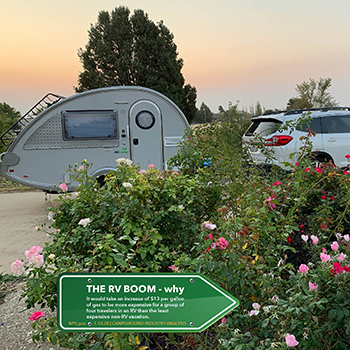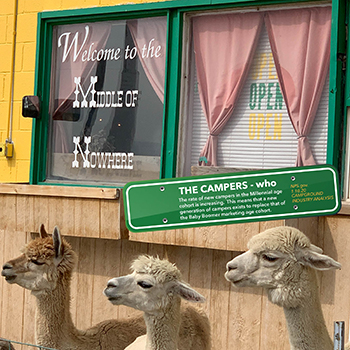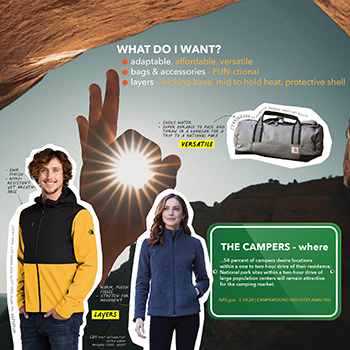What is “home?” Four walls, a door, a firm foundation? Or is it less wood and concrete, and more a feeling of belonging and a sense of purpose?
 Imagine for a moment a home with four wheels instead of walls and an ever-changing view out the window. Campervan living and the RV life are experiencing a boom as more Americans hit the road rather than settling down. You may be imagining retirees piloting giant land yachts, but it is younger generations taking their lives onto the open road in increasing numbers. Between 2014 and 2018, according to the National Parks Service Campground Trend Analysis, the percentage of new Millennial campers rose from 34% to 56%, while new Gen X and Boomer campers decreased over the same time frame.
Imagine for a moment a home with four wheels instead of walls and an ever-changing view out the window. Campervan living and the RV life are experiencing a boom as more Americans hit the road rather than settling down. You may be imagining retirees piloting giant land yachts, but it is younger generations taking their lives onto the open road in increasing numbers. Between 2014 and 2018, according to the National Parks Service Campground Trend Analysis, the percentage of new Millennial campers rose from 34% to 56%, while new Gen X and Boomer campers decreased over the same time frame.
One example of this is Noah Caldwell-Gervais. He was able to quit his day job at a Seattle pizzeria after he developed a following for his in-depth analysis of video games on YouTube. He spent his spare time fixing up a vintage VW van and eventually took the whole operation on the road with his wife and their dog, continuing to play games and post videos while exploring the backroads of the American West. Noah is one example of younger people opting out of the settled suburban life and embracing their wanderlust.
This lifestyle is becoming so prevalent that it has a name: digital nomad. Someone like Noah or the Trimble family can travel the country or even the world while working remotely. While the Trimbles were aware that they were in the minority as people of color adopting the RV life, that’s something they’re hoping to change by connecting with others and showing that it can be a viable option for anyone.
 More traditional jobs also have a place in the RV lifestyle. A thriving culture exists for “workamping,” jobs that make room for those living full-time or part-time out of an RV or campervan. These can include jobs at local restaurants, lodges and retail shops, or seasonal work at amusement parks and warehouses. Amazon’s Camperforce is a dedicated program with a growing community of campers who return to rotating work in a selection of Amazon fulfillment centers year after year.
More traditional jobs also have a place in the RV lifestyle. A thriving culture exists for “workamping,” jobs that make room for those living full-time or part-time out of an RV or campervan. These can include jobs at local restaurants, lodges and retail shops, or seasonal work at amusement parks and warehouses. Amazon’s Camperforce is a dedicated program with a growing community of campers who return to rotating work in a selection of Amazon fulfillment centers year after year.
At the heart of all this is the idea that if you can live anywhere, you can work from anywhere. This used to be a fantasy but in an increasingly connected world, your yard is whatever you see through the window and your home is the feeling of being right where you’re meant to be in the moment.
I’m not immune from this trend myself – in fact, my wife and I just returned in November from a trip of more than 4,000 miles, driving from Washington State to Texas in a Subaru with a TAB Boondock teardrop trailer towed behind us. Like the Trimbles, we did not want to risk flying during a pandemic. During those 18 days I worked from the road and saw some of the most beautiful country the United States has to offer. I can attest to the allure of the RV lifestyle.
Like many of the trends we examine here, the RV life is a matter of evolution, not revolution. These changes reflect what we’ve been seeing for years, now becoming so significant they are impossible to ignore. YouTube videos about “van life” are among the top trending topics as Millennials explore a more minimalist lifestyle. Rising house prices and the desire to live more sustainably have driven people to consider alternatives that fall outside the norm of a housebound life.
 When your day-to-day is on the road, that changes how you approach it. You won’t want a fancy wheeled suitcase for your campsite, when a rugged Carhartt® duffel is much easier to pack and more convenient to carry and throw into the RV when you’re ready to move on. Backpacks made for adventure are waterproof and durable. And a colorful, vibrant Cotopaxi bag can fit in with whatever you want to wear on your adventures. When you don’t have to worry about looking put-together while striding through the airport or fitting your luggage into an overhead bin, practicality, performance and adaptability become your main concerns.
When your day-to-day is on the road, that changes how you approach it. You won’t want a fancy wheeled suitcase for your campsite, when a rugged Carhartt® duffel is much easier to pack and more convenient to carry and throw into the RV when you’re ready to move on. Backpacks made for adventure are waterproof and durable. And a colorful, vibrant Cotopaxi bag can fit in with whatever you want to wear on your adventures. When you don’t have to worry about looking put-together while striding through the airport or fitting your luggage into an overhead bin, practicality, performance and adaptability become your main concerns.
The RV life is a trend that focuses on the freedom you gain by living small. “The traveler takes with them only what they can carry,” says Noah in one of his travel videos. “The fragments of understanding that fit in the backpack and the glovebox and the heart.”
When you’re living this way, your home is where you park it. And there’s something about that which appeals to the adventurer in all of us.
Next month, we’ll take a look at how we’re restoring the sense of connection that was disrupted last year and how important that is to the future we’re building. See you then!
